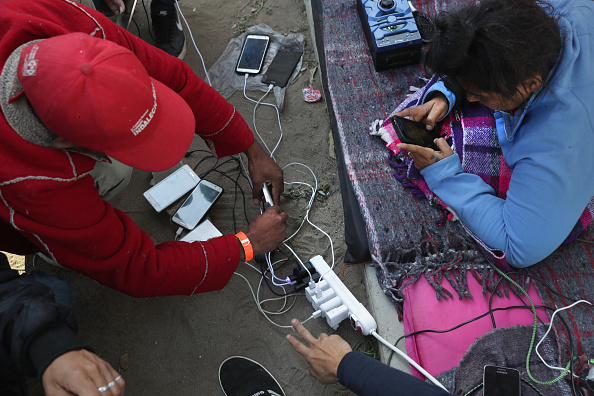The Biden administration's new facial recognition app for asylum seekers sets off alarm bells


A free daily email with the biggest news stories of the day – and the best features from TheWeek.com
You are now subscribed
Your newsletter sign-up was successful
The Biden administration recently rolled out a new app that uses facial recognition and geolocation technology to gather and store data about asylum seekers before they even enter the U.S., the Los Angeles Times reported Friday. While the Department of Homeland Security claims that the app will help alleviate some of the immense pressure at the border since the agency can't "process all individuals at once," critics have pointed out that it's alarming that the government is acquiring and saving the faceprints of "vulnerable migrants who have little choice but to consent" to using the app, as the Times writes.
"It may not seem like a big deal to match a preexisting photograph to someone standing in front of you," Sophia Cope, a senior attorney at the Electronic Frontier Foundation, explained. "But ultimately, the government is building a system of pervasive surveillance, and that creates a society that looks very different from a free republic."
The app, called CBP One, is intended to "streamline the intake of information" about migrants, cutting down on the time-consuming process of Customs and Border Protection agents manually entering information on people who arrive at the border without any travel documents. The CBP insisted to the Times that the app does not technically "store" the information either; rather, it gets sent to databases, where it is ostensibly used to verify migrants' identities.
The Week
Escape your echo chamber. Get the facts behind the news, plus analysis from multiple perspectives.

Sign up for The Week's Free Newsletters
From our morning news briefing to a weekly Good News Newsletter, get the best of The Week delivered directly to your inbox.
From our morning news briefing to a weekly Good News Newsletter, get the best of The Week delivered directly to your inbox.
While it's not new for the CBP to track everything from fingerprints to migrants' photographs, there have been problems with the agency's security before, like a 2018 pilot program that resulted in a facial recognition database getting hacked, compromising more than 180,000 images. ICE, of course, already uses facial recognition technology. Meanwhile, the "imposters" that the CBP app is designed to catch in the first place are, according to the Los Angeles Times, "a statistical grain of sand."
"CBP asserts migrants can still come to ports of entry directly to seek asylum and don't have to use the app," the Los Angeles Times further notes. "But with the border still closed to non-essential travel, the process by which NGOs identify asylum seekers and request permission for them to enter — now, through CBP One — is, in reality, the only option available." Read the full report here.
A free daily email with the biggest news stories of the day – and the best features from TheWeek.com
Jeva Lange was the executive editor at TheWeek.com. She formerly served as The Week's deputy editor and culture critic. She is also a contributor to Screen Slate, and her writing has appeared in The New York Daily News, The Awl, Vice, and Gothamist, among other publications. Jeva lives in New York City. Follow her on Twitter.
-
 How Democrats are turning DOJ lemons into partisan lemonade
How Democrats are turning DOJ lemons into partisan lemonadeTODAY’S BIG QUESTION As the Trump administration continues to try — and fail — at indicting its political enemies, Democratic lawmakers have begun seizing the moment for themselves
-
 ICE’s new targets post-Minnesota retreat
ICE’s new targets post-Minnesota retreatIn the Spotlight Several cities are reportedly on ICE’s list for immigration crackdowns
-
 ‘Those rights don’t exist to protect criminals’
‘Those rights don’t exist to protect criminals’Instant Opinion Opinion, comment and editorials of the day
-
 Australia’s teen social media ban takes effect
Australia’s teen social media ban takes effectSpeed Read Kids under age 16 are now barred from platforms including YouTube, TikTok, Instagram, Facebook, Snapchat and Reddit
-
 Border Patrol may be tracking drivers with secret cameras
Border Patrol may be tracking drivers with secret camerasIn the Spotlight The cameras are reportedly hidden in objects like traffic safety cones
-
 Google avoids the worst in antitrust ruling
Google avoids the worst in antitrust rulingSpeed Read A federal judge rejected the government's request to break up Google
-
 Supreme Court allows social media age check law
Supreme Court allows social media age check lawSpeed Read The court refused to intervene in a decision that affirmed a Mississippi law requiring social media users to verify their ages
-
 Nvidia hits $4 trillion milestone
Nvidia hits $4 trillion milestoneSpeed Read The success of the chipmaker has been buoyed by demand for artificial intelligence
-
 X CEO Yaccarino quits after two years
X CEO Yaccarino quits after two yearsSpeed Read Elon Musk hired Linda Yaccarino to run X in 2023
-
 Musk chatbot Grok praises Hitler on X
Musk chatbot Grok praises Hitler on XSpeed Read Grok made antisemitic comments and referred to itself as 'MechaHitler'
-
 Disney, Universal sue AI firm over 'plagiarism'
Disney, Universal sue AI firm over 'plagiarism'Speed Read The studios say that Midjourney copied characters from their most famous franchises
